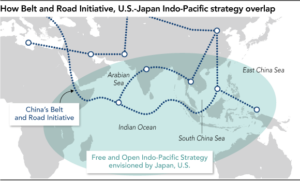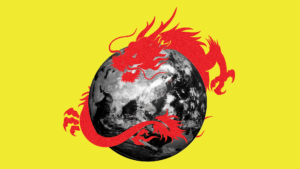 US Republican senator Marco Rubio has called on Malcolm Turnbull and Donald Trump to work together to develop joint strategies to counter China’s growing political interference, The Australian reports:
US Republican senator Marco Rubio has called on Malcolm Turnbull and Donald Trump to work together to develop joint strategies to counter China’s growing political interference, The Australian reports:
Senator Rubio said this week’s visit to Washington by the Prime Minister was an opportunity for the US to join forces with Australia to head off what he said was a global push by Beijing to undermine and infiltrate Western democracies. Senator Rubio, who heads an influential congressional committee on China, said the Chinese government was engaged “in the long game to fundamentally reshape the post-war liberal order”.
“While Australia has been on the frontlines in this fight, Chinese influence operations and ambitions are global in scope, including here in the United States,’’ he said.
China’s massive foreign influence campaign in the United States takes a long view, sowing seeds in American institutions meant to blossom over years or even decades. That’s why the problem of Chinese financial infusions into U.S. higher education is so difficult to grasp and so crucial to combat, The Washington Post’s Josh Rogin writes:
 At last, the community of U.S. officials, lawmakers and academics focused on resisting Chinese efforts to subvert free societies is beginning to respond to Beijing’s presence on America’s campuses…..With more than 100 universities in the United States now in direct partnership with the Chinese government through Confucius Institutes, the U.S. intelligence community is warning about their potential as spying outposts.
At last, the community of U.S. officials, lawmakers and academics focused on resisting Chinese efforts to subvert free societies is beginning to respond to Beijing’s presence on America’s campuses…..With more than 100 universities in the United States now in direct partnership with the Chinese government through Confucius Institutes, the U.S. intelligence community is warning about their potential as spying outposts.
“But the more important challenge is the threat the institutes pose to the ability of the next generation of American leaders to learn, think and speak about realities in China and the true nature of the Communist Party regime,” Rogin adds.
The last few months have seen increasing hostility to Chinese projects and influence in the U.S., notes analyst Peter Marino, the founder and policy director of The Metropolitan Society for International Affairs. Surveying the CCP’s growing ideological control of university education at home, many American universities are raising public  doubts about the viability of Beijing’s network of “Confucius Institutes” across U.S. campuses, he writes for Reuters:
doubts about the viability of Beijing’s network of “Confucius Institutes” across U.S. campuses, he writes for Reuters:
American political scientists who until recently touted the benefits of incorporating China into the global system are criticizing Beijing’s behavior and its motives and values. Joseph Nye, the Kennedy School political scientist who coined the term “Soft Power,” has begun to describe Chinese global influence as [what a National Endowment for Democracy report calls] Sharp Power, and says we must resist it. Last week, the director of the FBI warned that Chinese students in the U.S. might serve as “nontraditional” information collectors for Beijing.
As the world’s two largest economies compete to expand their spheres of influence, the U.S. and China are pushing separate development initiatives centered around the Indian Ocean, The Nikkei Review adds.
“We need to keep our eyes wide open,” Daniel Twining, the president of the International Republican Institute, said of what China is aiming to do in the Indian Ocean. On top of soft power, such as Chinese opera, and hard power, as represented in its military buildup, Twining warned of a third form of power that is taking shape.
 “There is now this emerging form of sharp power,” he said. Countries like China gain “undue leverage” through massive infrastructure investments. The targets of these influence operations are not limited to small nations in need of aid, but also strong democracies such as Australia and New Zealand.
“There is now this emerging form of sharp power,” he said. Countries like China gain “undue leverage” through massive infrastructure investments. The targets of these influence operations are not limited to small nations in need of aid, but also strong democracies such as Australia and New Zealand.
Twining described this as a new tool kit of power and influence. “We need to catch up. There is conversation about our own competitiveness and how we sharpen the tools in that tool kit,” he added.
But the Communist regime is conducting a counter-offensive against growing criticisms of its predatory influence, deriding what it calls the ‘China threat theory’.
 “China’s economic influence on South Asian nations is naturally growing following the country’s development. It is unstoppable. But it is also a result of the ‘America First’ policy, proposed by President Donald Trump, which reduces its global influence,” Liu Weidong, a research fellow at the Institute of American Studies of Chinese Academy of Social Sciences, told the Global Times [an official organ of the CCP]:
“China’s economic influence on South Asian nations is naturally growing following the country’s development. It is unstoppable. But it is also a result of the ‘America First’ policy, proposed by President Donald Trump, which reduces its global influence,” Liu Weidong, a research fellow at the Institute of American Studies of Chinese Academy of Social Sciences, told the Global Times [an official organ of the CCP]:
The issue is likely to be brought up at Turnbull’s private lunch with the US Director of National Intelligence Daniel Coats in Washington this week. Their concern reflects that the influence of the US and its allies in Southeast Asia is waning. Many countries in the region have realized that they have to be independent to achieve modernization, so now they refuse to obey the West as they did before. This is not because of China, but because of the arrogance of the West, said Xu Liping, a senior research fellow at the Chinese Academy of Social Sciences. China’s cooperation with the countries in the region is based on real benefit, economic interest and mutual respect rather than ideology, and China’s neighbors are voluntarily learning from China’s experiences rather than China forcing anyone to copy its model….
 “So the US and Australia have to be aware that for other countries in the region, China’s growing influence is not a threat, but an opportunity. Hyping the ‘China threat theory’ is useless, meaningless and groundless,” Xu said.
“So the US and Australia have to be aware that for other countries in the region, China’s growing influence is not a threat, but an opportunity. Hyping the ‘China threat theory’ is useless, meaningless and groundless,” Xu said.
Ideology defined the early decades of the relationship between China and the U.S., making them adversaries for nearly 30 years, Marino adds:
But since the post-Mao thaw of the late 1970s, and especially after Deng Xiaoping’s “Reform and Opening” of the country in 1979, the U.S. and China have shelved most ideological differences while pursuing common interests, from trade to terrorism to the environment.
 Despite this cooperation, basic ideological differences remained unresolved. American political culture remains committed to democracy, openness, civil liberties and a boisterous public sphere. The CCP is committed to unitary rule, authoritarian values, and absolute control of information.
Despite this cooperation, basic ideological differences remained unresolved. American political culture remains committed to democracy, openness, civil liberties and a boisterous public sphere. The CCP is committed to unitary rule, authoritarian values, and absolute control of information.
At The Washington Post, Center for Strategic and International Studies fellow Jonathan E. Hillman looks at the contradictions between Xi Jinping’s domestic drive to reinforce government control, and his international ambition to broaden China’s global clout while simultaneously making China a stalwart of globalization [through] his grand Belt and Road Initiative that has attracted both international excitement and concern, notes China Digital Times, a grantee of the National Endowment for Democracy:
This fundamental tension — between maintaining control and promoting connectivity — extends into the Belt and Road’s very core….[…] Hardest to reconcile may be the Belt and Road’s promise to speed the flow of information and ideas. As Xi said at the Belt and Road Forum in Beijing last year, “The ancient silk routes were not for trade only, they boosted flow of knowledge as well. … Today, a multi-dimensional infrastructure network is taking shape … featuring land-sea-air transportation routes and an information expressway.” But Chinese censorship and cyber security laws have become more intrusive. China is also offering to help other countries learn from its “Great Firewall” — in effect sharing knowledge to limit knowledge-sharing.
 In September 2017, Anne-Marie Brady (right), a scholar of China at the University of Canterbury in New Zealand, published a report titled “Magic Weapons: China’s Political Influence Activities Under Xi Jinping,” writes Jeremy Goldkorn, co-founder of the Sinica Podcast:
In September 2017, Anne-Marie Brady (right), a scholar of China at the University of Canterbury in New Zealand, published a report titled “Magic Weapons: China’s Political Influence Activities Under Xi Jinping,” writes Jeremy Goldkorn, co-founder of the Sinica Podcast:
- Last week, Brady spoke to the Australian Parliament’s Intelligence and Security Committee, according to the New Zealand Herald. She told them that her office was broken into in December, and that in the last week, she received a “warning letter” that she was about to be attacked, followed by a burglary at her house — only laptops and mobile phones were taken.
- “People I’ve associated with in China, just last year, were questioned by the Chinese Ministry of State Security about their association with me,” Brady added. She suspects these events are connected with her work on influence activities.
- Yesterday, New Zealand’s prime minister, Jacinda Ardern, ordered her country’s intelligence agencies to investigate Brady’s claims, according to the Herald.
 Australian PM Malcolm Turnbull in December declared — in Mandarin, to boot — that his country would “stand up” to Chinese influence in December, and his government introduced legislation to restrict the activities of foreign political donors and lobbyists. This legislation has still not been formally debated, but Beijing immediately reacted to Turnbull’s remarks with fury. (Read more on China-Australia relations here.)
Australian PM Malcolm Turnbull in December declared — in Mandarin, to boot — that his country would “stand up” to Chinese influence in December, and his government introduced legislation to restrict the activities of foreign political donors and lobbyists. This legislation has still not been formally debated, but Beijing immediately reacted to Turnbull’s remarks with fury. (Read more on China-Australia relations here.)- There are “increasing signs that China is using its $9 billion annual spend by international students as leverage” to pressure Australia over these and other issues, the Australian reports (paywall). The Chinese consulate in Sydney posted a safety warning to Chinese students in the country on February 14, while a number of education exchanges between the two countries have been postponed or canceled in the past month.
- “New Zealand risks becoming a ‘Western ally with Chinese characteristics’ because it has embraced a less strident tone towards Beijing’s assertiveness,” according to an Australian think tank, as reported by the Australian Financial Review (paywall). The report urges Australia to step up military engagement with its smaller neighbor “to shore up the alliance.”
- The American FBI director, Christopher Wray, last week warned of a “whole-of-society” espionage threat from China to the U.S., particularly via “non-traditional collectors” such as students and academics. RTWT







